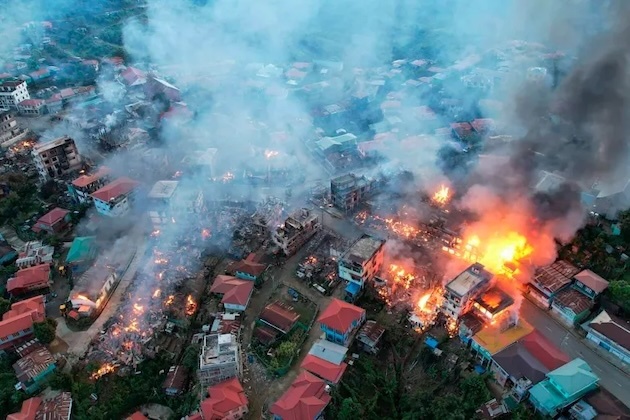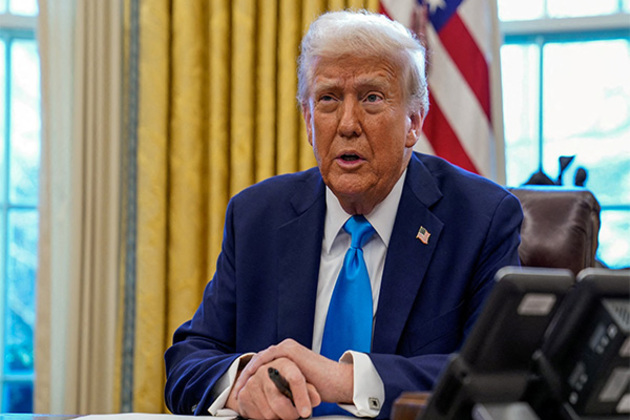Rising inflation, COVID-19 make people more vulnerable in Nepal
Xinhua
23 Jan 2022, 08:48 GMT+10

Many families in Nepal are struggling these days due to reduced job opportunities and growing inflation amid the COVID-19 pandemic, which has continued into the new year and brought surging daily infections of more than 10,000 in the past few days.
KATHMANDU, Jan. 23 (Xinhua) -- Radha Tamang, a 60-year-old woman living in a squatter settlement on the bank of the Bagmati River in Kathmandu of Nepal, had an easier life two years ago when her son had a job at a trekking agency with a decent income.
As the raging COVID-19 pandemic made her son first jobless and then re-employed but with a pay cut, life had become harder for Tamang. She and her daughter-in-law are both working now as house cleaners.
"Now our family's income has decreased since my son lost his job at a trekking company," Tamang said. "So we're struggling to afford essential foods and non-food items as prices of everything are going up."
The temporary hut housed Tamang and her husband, who has a chronic ailment, her son and daughter-in-law, and a grandson.
Soaring prices have made life difficult as well for Garjuman Singh Tamang, who lives in the same squatter settlement. He works as a waste collector for a private company and earns 12,000 Nepali rupees (101 U.S. dollars) a month, less than the minimum wage set by the Nepali government at 15,000 Nepali rupees (126 dollars) per month.
"My wage has remained the same, but the prices of everything from rice, cooking gas, vegetables, ghee and oil have gone up, making life difficult for my family to afford these goods," he said. His wife is not a regular daily wage earner, but they have six family members to feed.
The family had to rely on money sent from abroad by Garjuman's sister-in-law during the first and second waves of the pandemic in the last two years, since his wife could not go to work at the time.

Many families in Nepal are struggling these days due to reduced job opportunities and growing inflation amid the COVID-19 pandemic, which has continued into the new year and brought surging daily infections of more than 10,000 in the past few days.
The monthly consumer price inflation climbed to 7.11 percent in December, the highest in 64 months, from 5.32 percent in November, according to data from the country's central bank.
As a result, the prices of edible oil and ghee had surged year on year by 28.52 percent, followed by pulses and legumes at 11.79 percent, and tobacco products at 11.74 percent in December.
In terms of the wholesale price index, wood and wood products saw the highest price rise of 26.35 percent, followed by fuel and power at 22.27 percent, and construction materials at 19.34 percent.
Experts said that rising inflation has been affecting the lives of the general people badly at a time when they are suffering from joblessness and less income.
"The biggest impact of higher inflation is on the daily wage earners and those with fixed incomes," said Prakash Kumar Shrestha, chief of the economic research department at the central bank. "As inflation contributes to a fall in the purchasing power of people, it has affected the livelihoods of many downtrodden people."
Experts have blamed the rising inflation in Nepal on supply chain disturbance, high petroleum prices, increasing transport fares and shipping charges.

The South Asian country relies heavily on imported goods, particularly those from India, which is also suffering from rising inflation in recent months.
Nepal's imports reached as high as 838.4 billion rupees (7.02 billion dollars) in the first five months of the current fiscal year that began in mid-July last year and around 60 percent were from India, according to the central bank figures.
For the last fiscal year, the average annualized inflation was 3.6 percent, which was lower "because of suppressed demands due to lockdowns, which led to the closure of markets," said Shrestha.
Experts said that they were expecting the inflation to grow in the next few months after the country further increased the prices of petroleum products in the past week, and that a possible depreciation of the Nepali currency against the dollar may also contribute to increasing prices of imported goods.
In November last year, the central bank's inflation expectation survey showed that most people expected the average prices of goods and services to rise by a staggering 11.3 percent for a year.
"One factor that could contribute to further rise in inflation in the days to come is the proposed elections in 2022," said Puspa Lal Shakya, an economics scholar. "Political parties and their candidates shall spend heavily to win elections, creating more demands for goods and services and contributing to a rise in inflation."
Nepal will see local, provincial and federal elections in 2022 constitutionally following elections in 2017.
Experts, however, have not ruled out the possibility of inflation being tamed due to a slump in demands over possible lockdown and more restrictive measures to control the spread of the coronavirus.
 Share
Share
 Tweet
Tweet
 Share
Share
 Flip
Flip
 Email
Email
Watch latest videos
Subscribe and Follow
Get a daily dose of Central Asia Times news through our daily email, its complimentary and keeps you fully up to date with world and business news as well.
News RELEASES
Publish news of your business, community or sports group, personnel appointments, major event and more by submitting a news release to Central Asia Times.
More InformationInternational
SectionTurkey, France battle wildfires amid early Europe heatwave
ISTANBUL/PARIS/BRUSSELS: As searing temperatures blanket much of Europe, wildfires are erupting and evacuation orders are being issued...
Venetians protest Bezos wedding with march through the town
VENICE, Italy: Over the weekend, hundreds of protesters marched through the narrow streets of Venice to voice their opposition to billionaire...
New French law targets smoking near schools, public spaces
PARIS, France: France is taking stronger steps to reduce smoking. A new health rule announced on Saturday will soon ban smoking in...
Trump hints at DOGE investigation of Musk subsidies
WASHINGTON, DC - U.S. President Donald Trump on Tuesday claimed Elon Musk's success has been built on government subsidies. Without...
Native leaders, activists oppose detention site on Florida wetlands
EVERGLADES, Florida: Over the weekend, a diverse coalition of environmental activists, Native American leaders, and residents gathered...
Beijing crowds cheer AI-powered robots over real soccer players
BEIJING, China: China's national soccer team may struggle to stir excitement, but its humanoid robots are drawing cheers — and not...
Asia
SectionBeijing crowds cheer AI-powered robots over real soccer players
BEIJING, China: China's national soccer team may struggle to stir excitement, but its humanoid robots are drawing cheers — and not...
COVID-19 source still unknown, says WHO panel
]LONDON, U.K.: A World Health Organization (WHO) expert group investigating the origins of the COVID-19 pandemic released its final...
DeepSeek faces app store ban in Germany over data transfer fears
FRANKFURT, Germany: Germany has become the latest country to challenge Chinese AI firm DeepSeek over its data practices, as pressure...
UN Demands End to Myanmar Violence as Junta’s Election Plans Risk Further Instability
Nearly three months after a devastating earthquake struck Myanmar, the country remains trapped in a deepening crisis, compounded by...
US-Vietnam trade deal offers cautionary lessons for India, says GTRI Report
New Delhi [India], July 3 (ANI): A new trade agreement between the United States and Vietnam is raising concerns and offering key lessons...
"Not going to let this Communist Lunatic destroy New York": Trump again takes a dig at NYC Dem primary Mamdani
Washington, DC [US], July 2 (ANI): US President Donald Trump was yet again at his rhetoric against the Democratic mayoral nominee for...












